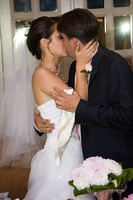Category: "Family"
Брат
If you want to talk about your brother, the most likely word you will use in Russian is брат. It has an irregular plural form:
| Sg | Pl | |
| Nom | брат | братья |
| Acc | брата | братьев |
| Gen | ||
| Pre | брате | братьях |
| Dat | брату | братьям |
| Ins | братом | братьями |
Very often брат is used with the words старший older/oldest and младший younger/youngest. Since those words are ambiguous, I like to fudge in non-professional work and translate them as big and little. In professional translation, of course, you should determine whether the superlative meaning (oldest/youngest) or comparative meaning (older/younger) is the correct one:
| Это мой старший брат. | This is my oldest brother. This is my older brother. This is my big brother. |
| Это мой младший брат. | This is my youngest brother. This is my younger brother. This is my little brother. |
| — Откуда у тебя синяк под глазом? — Я положил целую кучу червяков под одеяло моего брата, и за это он меня побил. |
“How did you get that black eye?” “I put a whole bunch of worms under my brother's bedspread, and he hit me for it.” |
| Передай своему брату привет. Я по нему скучаю. | Tell your brother ‘hi’ for me. I miss him. |
| — Мы с братом вчера подожгли старый сарай за фабрикой. — Ну вы дураки! — Ничего мы не дураки. В нём ничего не было. К тому же, было интересно. |
“Yesterday my brother and I set fire to the old shed behind the factory.” “You are such idiots!” “We're not idiots. There was nothing in it. Besides, it was fun.” |
| Мы с братьями вчера ходили на «Солт». Мы все любим Анджелину Джоли. | Yesterday my brothers and I went to see [the movie] “Salt.” We all love Angelina Jolie. |
Горько
 Last weekend I was invited to my friend’s wedding. It was a great celebration with lots of dancing, delicious Russian food and… wait for it… drinking!
Last weekend I was invited to my friend’s wedding. It was a great celebration with lots of dancing, delicious Russian food and… wait for it… drinking! ![]() Being there made me think of a great word to write about — «горько». No Russian wedding can go without people yelling «горько» to the bride and groom. Literally translated, this word means "bitter”. According to the tradition, people say it at the end of their toasts or just surprise the newlyweds with it at any moment during the wedding to make them kiss. The idea behind this tradition is that the guests want to see the bride and groom kiss. By yelling «горько», people let them know that they can’t stand the “bitterness” in the air and ask them to make it sweeter by kissing each other.
Being there made me think of a great word to write about — «горько». No Russian wedding can go without people yelling «горько» to the bride and groom. Literally translated, this word means "bitter”. According to the tradition, people say it at the end of their toasts or just surprise the newlyweds with it at any moment during the wedding to make them kiss. The idea behind this tradition is that the guests want to see the bride and groom kiss. By yelling «горько», people let them know that they can’t stand the “bitterness” in the air and ask them to make it sweeter by kissing each other.
| Я хочу вам пожелать долгой и счастливой совместной жизни! Горько! | I would like to wish you a long life of happiness together! Give us some sugar! |
| Когда гости закричали «горько», жених поцеловал невесту. | When the guests yelled “bitter,” the groom kissed the bride. |
| — У меня выскочила лихорадка! — Что же ты будешь делать, когда «горько» кричать будут? — Ну, знаешь же, как говорят, что у мужа с женой всё должно быть общее… вот мы и это разделим! |
“I got a cold sore!” “What are you going to do when they yell “kiss”?” "Well, you know how they say, “what’s mine is yours now”… so we’ll share that too!" |
 Sometimes the guests play it trickier and instead of just yelling «горько», they start saying that the wine is bitter or the food is bitter; thus, indirectly asking the newlyweds to sugar it up. Once they made them kiss, everybody begins counting very slowly to see how long the kiss will last. It is generally considered that the more the guests yell, «горько», the happier the couple’s life will be. Therefore, when you are at a Russian wedding, don’t hesitate to use it!
Sometimes the guests play it trickier and instead of just yelling «горько», they start saying that the wine is bitter or the food is bitter; thus, indirectly asking the newlyweds to sugar it up. Once they made them kiss, everybody begins counting very slowly to see how long the kiss will last. It is generally considered that the more the guests yell, «горько», the happier the couple’s life will be. Therefore, when you are at a Russian wedding, don’t hesitate to use it! ![]()
Мама, мать
There are two standard words in Russian for mother: мама, мать. The former is perfectly regular, and the latter is one of the most ancient words in the language and retains old quirks to it:
| Sg | Pl | |
| Nom | мать | матери |
| Acc | мать | матерей |
| Gen | матери | матерей |
| Pre | матери | матерях |
| Dat | матери | матерям |
| Ins | матерью | матерями |
Although these words mean basically the same thing, they are stylistically different. A child would never say «Мать приготовила ужин» “Mother prepared dinner.” A child will only say «Мама приготовила ужин». Roughly speaking, children, young adults, and adults still living with their parents will usually refer to their parents as мама and папа. As they grow into later adulthood, people in their thirties and forties will refer to their parents as мать and отец. It just sounds more grown up.
Тhese are not hard and fast rules. Emotional closeness and gender influence things as well. A forty year old woman with a really close relationship to her mother may well call her мама. It is less probable that a forty year old man would do so, but it is still possible. And a twenty year old woman whose mother is a shrew may well refer to her as мать.
Sample sentences:
| — Доченька, не надо шоколада есть. Если потолстеешь, никак не найдёшь мужа. — Мама, перестань меня критиковать. Шоколад по крайней мере никогда не изменит мне. |
“Sweetie, don't eat chocolate. If you get fat, you'll never find a husband.” “Mama, stop criticizing. Chocolate at least will never cheat on me.” |
| Папа, ты не забыл купить маме торт на день рождения? | Papa, did you remember to buy Mom a cake for her birthday? |
| Мать в четвёртый раз собирается выйти замуж. Она уже пережила первых трёх мужей. | My mother is getting ready to marry for the fourth time. She has already outlived her first three husbands. |
| У нас с матерью всё время споры. Не люблю с ней общаться. | My mother and I constantly argue. I don't like communicating with her. |
Семья
The Russian word for family is семья. Family is a very important part of my life and I could not imagine myself without them. When I lived in Russia, we set one day out of each year to be together as a family. Most of my extended family came to my home from different parts of Russia and Ukraine to spend the day feasting, dancing, and talking. When the big family arrived to the gathering, there were many of my aunts тёти, uncles дяди, grandmothers бабушки, grandfathers дедушки, nephews племянники, nieces племянницы, and grandchildren внуки. One of my aunts had a young son сын and daughter дочка who were two of the most energetic children I have ever seen. I felt that sometimes they were so hyper that I could not sit them down to do anything quiet even for a few minutes. During the family dinner, my mother stood up and made a toast «Я очень рада, что сегодня вся наша семья собралась, чтобы провести этот день вместе» “I am very happy that all of our family gathered today to spend time together.” It is always difficult for me when some of my family travel back to their home because I do not get to see them very often, but I always look forward to the day when we will again gather together and spend time bonding and having fun.
Новорождённые дети
The Russian word for newborn infants is новорождённые дети. In America, it is customary to show our appreciation and excitement for an upcoming baby by giving the family a baby shower. However, in Russia, this is usually not the practice until after a baby is born. It is thought by many Russians that expressing happiness and excitement for a new baby should only be done after the baby has successfully entered into the world.
Another important Russian tradition is giving the parents of the baby a sweet treat as a gift. This sweet gift can be honey мёд, sugar сахар, or candy конфеты and symbolizes a sweet future for the child. My mother told me that when I was born, my great grandmother brought a large jar of homemade honey and as she handed my parents this gift, she said «Пусть этот мед принесёт Оле сладкую жизнь!» “Let this honey bring Olga a sweet life!”